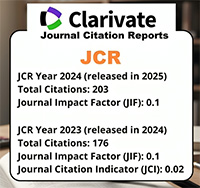Value of endorectal ultrasonography in the assessment of invasion staging of low rectal cancer with local progression after neoadjuvant radiochemotherapy.
Valor de la ultrasonografía endorectal en la evaluación de la estadificación de la invasión del cáncer rectal bajo con progresión local, después de administrar radioquimioterapia neoadyuvante.
Abstract
Although stages T3 and T4 rectal cancer can be reduced to T1 or T2 after neoadjuvant radiochemotherapy, the accuracy of the endorectal ultrasonography (ERUS) for the post-radiochemotherapy evaluation of low rectal cancer has seldom been reported. We aimed to investigate the value of ERUS in the assessment of invasion staging in low rectal cancer with local progression, and the factors affecting its accuracy, after neoadjuvant radiochemotherapy. A total of 114 patients administered with neoadjuvant radiochemotherapy for stages II and III low rectal cancer (local stage T3/T4) from February 2018 to December 2020 were enrolled in the study. The changes in local lesions were evaluated using ERUS before and after radiochemotherapy, and compared with the pathological T staging. The accuracy of post-neoadjuvant radiochemotherapy restaging examined with ERUS was evaluated, and univariate analysis was used to identify the factors affecting the accuracy. After neoadjuvant radiochemotherapy, the blood flow distribution within the lesion significantly declined (P<0.05), the max length and max thickness of the longitudinal axis of the lesion were reduced (P<0.05), and the uT staging was decreased (P<0.05), when compared with lesions before the treatment. Compared with postoperative pathological T staging, the accuracies of ERUS in T1, T2, T3 and T4 stages were 11.11%, 28.57%, 27.27% and 100%, respectively. Univariate analysis indicated that review time of ERUS, post-operative T staging and Wheeler rectal regression stage were factors affecting the accuracy of ERUS re-staging. ERUS is more accurate for T4 re-staging, follow-up reviewed six weeks after neoadjuvant radiochemotherapy and low regression tumors, with a high application value for the assessment of the efficacy of neoadjuvant radiochemotherapy for low rectal cancer.
Downloads
References
Holubar SD, Brickman RK, Greaves SW, Ivatury SJ. Neoadjuvant radiotherapy: A risk factor for short-term wound complications after radical resection for rectal cancer? J Am Coll Surg 2016; 223: 291-298.
Abdelazez MA, Eteba SM, Elzahhaf EH, Aziz SRA, Omar R, Abdallah EA. Neoadjuvant chemotherapy and concomitant boost radiotherapy in the treatment of locally advanced rectal cancer. J Cancer Tumor Int 2021; 11: 1-19.
Hardiman KM, Antunez AG, Kanters A, Schuman AD, Regenbogen SE. Clinical and pathological outcomes of induction che- motherapy before neoadjuvant radiotherapy in locally-advanced rectal cancer. J Surg Oncol 2019; 120: 308-315.
Kwakye G, Curran T, Uegami S, Finne CO 3rd, Lowry AC, Madoff RD, Jensen CC. Locally excised T1 rectal cancers: need for specialized surveillance protocols. Dis Colon Rectum 2019; 62: 1055-1062.
Fan Z, Cong Y, Zhang Z, Li R, Wang S, Yan K. Shear wave elastography in rectal cancer staging, compared with endorectal ultrasonography and magnetic resonance imaging. Ultrasound Med Biol 2019; 45: 1586-1593.
Chen YX, Zheng B, Li C, Shi G, Ren YP, Meng QK. [Evaluation of ERUS on post- new adjuvant radiochemotherapy invasion staging and the affect factors in low rectal regional progressed cancer]. J Modern Oncol 2016; 24: 3963-3966, 3967.
Tokuhara K, Ueyama Y, Nakatani K, Yoshioka K, Kon M. Outcomes of neoadjuvant chemoradiotherapy in Japanese locally advanced rectal carcinoma patients. World J Surg Oncol 2016; 14: 136.
De Felice F, Izzo L, Musio D, Magnante AL, Bulzonetti N, Pugliese F, Izzo P, Di Cello P, Lucchetti P, Izzo S, Tombolini V. Clinical predictive factors of pathologic complete response in locally advanced rectal cancer. Oncotarget 2016; 7: 33374-33380.
Yimei J, Ren Z, Lu X, Huan Z. A comparison between the reference values of MRI and EUS and their usefulness to surgeons in rectal cancer. Eur Rev Med Pharmacol Sci 2012; 16: 2069-2077.
De Jong EA, ten Berge JC, Dwarkasing RS, Rijkers AP, van Eijck CH. The accuracy of MRI, endorectal ultrasonography, and computed tomography in predicting the response of locally advanced rectal cancer after preoperative therapy: A meta-analysis. Surgery 2016; 159: 688-699.
Cote A, Graur F, Lebovici A, Mois E, Al Hajjar N, Mare C, Badea R, Iancu C. The accuracy of endorectal ultrasonography in rectal cancer staging. Clujul Med 2015; 88: 348-356.
Zhao L, Liang M, Shi Z, Xie L, Zhang H, Zhao X. Preoperative volumetric synthetic magnetic resonance imaging of the primary tumor for a more accurate prediction of lymph node metastasis in rectal cancer. Quant Imaging Med Surg 2021; 11: 1805-1816.
Marone P, de Bellis M, D’Angelo V, Delrio P, Passananti V, Di Girolamo E, Rossi GB, Rega D, Tracey MC, Tempesta AM. Role of endoscopic ultrasonography in the locoregional staging of patients with rectal cancer. World J Gastrointest Endosc 2015; 7: 688-701.
Battersby NJ, How P, Moran B, Stelzner S, West NP, Branagan G, Strassburg J, Quirke P, Tekkis P, Pedersen BG, Gudgeon M. Prospective validation of a low rectal cancer magnetic resonance imaging staging system and development of a local recurrence risk stratification model: The MERCURY II Study. Ann Surg 2016; 263: 751-760.
Li Q, Peng Y, Wang LA, Wei X, Li MX, Qing Y, Xia W, Cheng M, Zi D, Li CX, Wang D. The influence of neoadjuvant therapy for the prognosis in patients with rectal carcinoma: a retrospective study. Tumour Biol 2016; 37: 3441-3449.
Badea R, Gersak MM, Dudea SM, Graur F, Al Hajjar N, Furcea L. Characterization and staging of rectal tumors: endoscopic ultrasound versus MRI/CT. Pictorial essay. Med Ultrason 2015; 17: 241-247.
Gersak MM, Badea R, Graur F, Hajja NA, Furcea L, Dudea SM. Endoscopic ultra-sound for the characterization and staging of rectal cancer. Current state of the method. Technological advances and perspectives. Med Ultrason 2015; 17: 227-234.





















